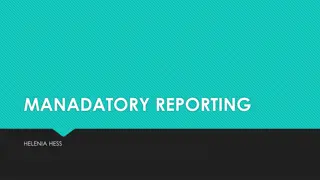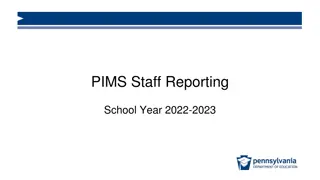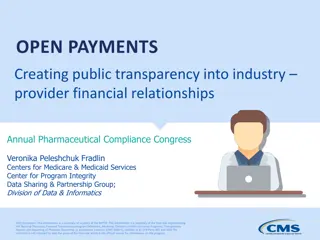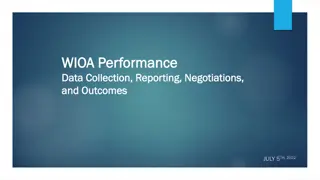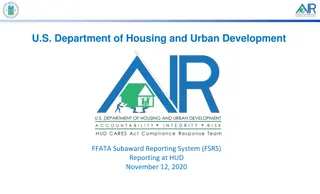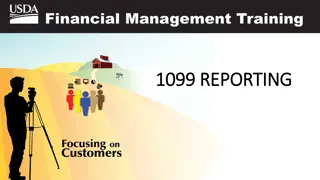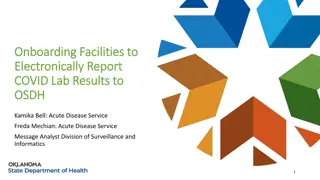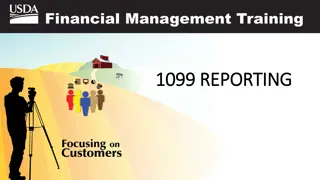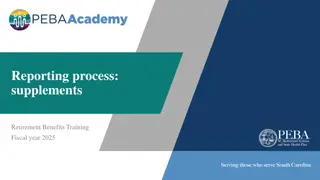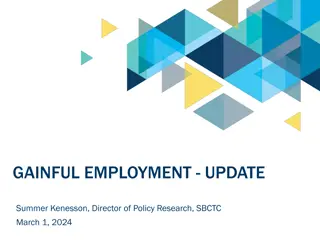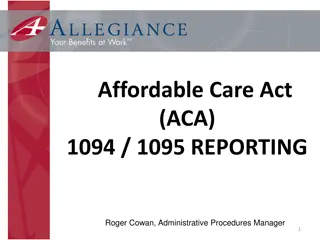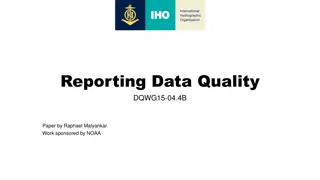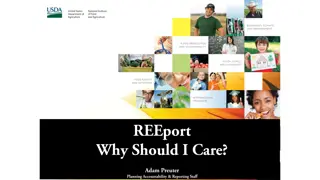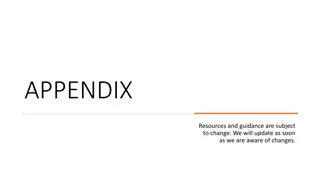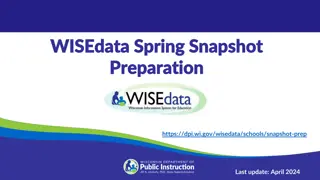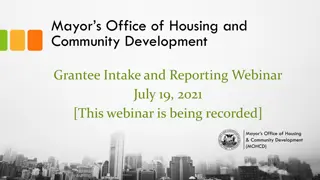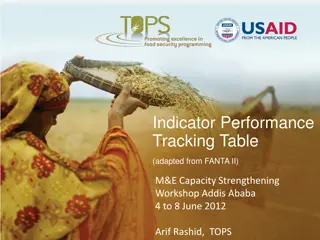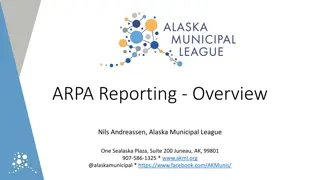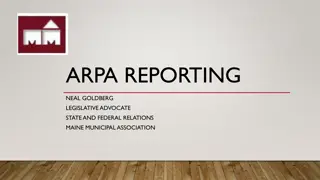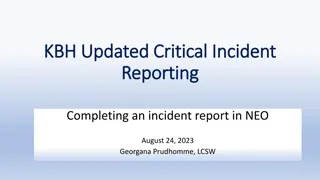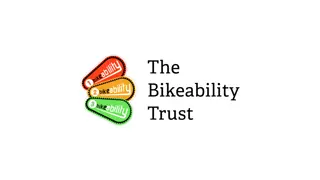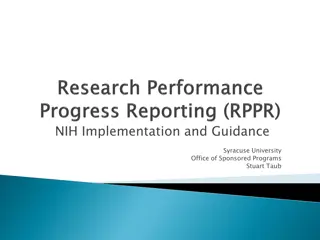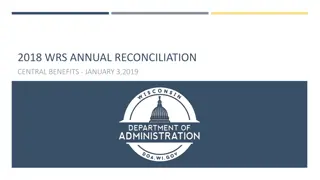Ergonomics: Employee training
This comprehensive training program focuses on ergonomics for employee safety. Employers subject to relevant sections must train employees on safety committee details, ergonomics program, musculoskeletal injury signs, reporting procedures, hazard reporting, controls, and compliance requirements. It
0 views • 15 slides
ECC Social Value Reporting and Evaluation Framework
Essex County Council (ECC) has implemented a robust Social Value Reporting and Evaluation framework based on the Local Government Association's National TOMs method. This framework categorizes and assesses social value contributions in two parts - Value Score and Supporting Statement Score - to deri
3 views • 16 slides
Importance of Integrating Sustainability Reporting in Government Accounting
Sustainability reporting in government accounting in Africa promotes transparency, supports Sustainable Development Goals, attracts investments, manages resources, enhances efficiency, and fosters partnerships. The role of government accounting is crucial for transparent and sustainable governance t
3 views • 9 slides
Overview of Fall 2019 Reporting Information Session
High-level overview of TRS reporting for Fall 2019 including legislative changes, summary of rate changes for fiscal years, tips on starting a new year, and additional reporting tips. The presentation emphasizes the importance of accurate reporting and compliance with TRS Laws and Rules. Ensure time
1 views • 29 slides
Mandatory Reporting Guidelines for Suspected Child Abuse/Neglect
Understanding mandatory reporting requirements for child abuse and neglect is crucial for various professionals and individuals working with children. This content emphasizes the legal obligations and procedures involved in reporting suspected cases, ensuring immunity for those reporting in good fai
1 views • 6 slides
Comprehensive Overview of PIMS Staff Reporting for School Year 2022-2023
Offering insights into PIMS Staff Reporting agenda, reasons for data reporting, roles of EL Coordinators, and details on Professional Staff reporting criteria and templates. The content covers federal reporting requirements, Equitable Access data, and trends in education personnel.
1 views • 39 slides
Enhancing Public Transparency in Physician Financial Relationships through Open Payments Program
The Open Payments Program ensures transparency in the healthcare industry by requiring manufacturers to report payments made to physicians and teaching hospitals. This disclosure program aims to promote accountability and a transparent healthcare system. Key terms include Reporting Entities (manufac
0 views • 30 slides
WIOA Performance Data Collection and Reporting Overview
Requirements for reporting under the WIOA program, including data collection, negotiations, and outcomes reporting. Details on the reporting periods, reporting entities, core programs, partners, and the individuals included in the Participant Individual Record Layout (PIRL) reports.
7 views • 25 slides
Understanding FFATA Subaward Reporting System (FSRS) at HUD
FFATA requires federal award information to be publicly available on a searchable website. FSRS is a reporting tool for prime awardees to report sub-recipient/contractor awards and executive compensation data. This article delves into FFATA requirements, FSRS roles, responsibilities, and reporting p
2 views • 15 slides
Understanding 1099 Reporting Guidelines and Systems
The article provides insights into the 1099 reporting process, including details about the Miscellaneous Income System (MINC), Form 1099 issuance, criteria for 1099 reporting, the Statement of Earnings System (EARN), and the Special Payroll Processing system (SPPS). It explains the responsibilities
2 views • 15 slides
Streamlining Electronic Reporting of COVID Lab Results to OSDH
This documentation outlines the process of electronically reporting COVID lab results to the Oklahoma State Department of Health (OSDH). It covers the purpose, available options, specifications, formats, and the onboarding and testing process, aiming to accelerate the reporting of healthcare facilit
1 views • 9 slides
Overview of 1099 Reporting Systems
The 1099 Reporting Systems consist of MINC, EARN, and SPPS, which are used for IRS 1099 reporting purposes. These systems handle transactions and generate Form 1099 for recipients based on predefined criteria. Taxpayers are responsible for accurate reporting to the IRS, with reporting thresholds set
1 views • 15 slides
Hemp Acreage Reporting & Certification Q&A with USDA
Explore essential information about Hemp Acreage Reporting, Certification, and compliance procedures in this Q&A session with the Farm Service Agency (USDA). Learn about important deadlines, required documentation, and the significance of reporting accuracy for various programs. Discover how to file
1 views • 15 slides
UNEP Support for Improving UNCCD Reporting Procedures
UNEP has been providing support since 2010 to enhance the reporting processes of the UNCCD, focusing on streamlined funding approaches, technical assistance, and capacity building. Key outcomes include the development of reporting tools, online reporting systems, and building credible data from coun
0 views • 14 slides
Climate Change Monitoring, Reporting, and Verification (MRV) Training Session Overview
This document outlines the purpose and reporting requirements for the development of a Climate Change Monitoring, Reporting, and Verification (MRV) system, focusing on projections and scenarios. It highlights the importance of collecting information for climate mitigation, assisting Serbia in meetin
0 views • 19 slides
Use of Force and De-escalation Training Pilot Program Reporting
The Use of Force and De-escalation Training Pilot Program aims to enhance law enforcement training methods. Established under the 2022 Budget Act, it requires reporting on participant demographics, training details, incidents, expenditure, and satisfaction metrics. Reports include baseline, annual d
4 views • 15 slides
Transitioning to Incident-Based Crime Reporting: Enhancing Transparency and Accountability
Anytown Police Department (APD) is leading the transition from Summary Reporting to Incident-Based Reporting through the National Incident-Based Reporting System (NIBRS). This change promotes transparency, provides detailed crime data to the public, and improves statewide and national crime statisti
3 views • 17 slides
Insights into Structured Reporting Practices in Colorectal Cancer Imaging
A survey conducted by Dr. Eric Loveday at North Bristol NHS Trust revealed the current landscape of structured reporting in MRI and CT scans for rectal and colon cancer. Results indicate a positive outlook towards implementing national standards for structured radiology reporting, with an emphasis o
0 views • 7 slides
Employee Benefits Reporting and Training Procedures for Fiscal Year 2025
The reporting process for retirement benefits in fiscal year 2025 includes supplements, employer reporting representatives, supplemental contribution reporting, service reports, furlough supplements, and a disclaimer. Employers can find detailed instructions on submitting various forms through the E
1 views • 6 slides
Streamlining Gainful Employment Reporting Process for Title IV Programs
Gainful Employment reporting requirements for Title IV programs involve historical uploads, student data submissions, and a detailed workplan by SBCTC to assist colleges in meeting compliance. The reporting burden includes annual updates and student-level data reporting. SBCTC's workplan aims to red
0 views • 16 slides
Affordable Care Act (ACA) 1094/1095 Reporting Guidelines
Affordable Care Act (ACA) requires employers to report information to the IRS regarding individual and employer responsibilities under the ACA. The reporting includes details on individual responsibility, employer responsibility, exemptions, and reporting requirements for different types of employer
0 views • 52 slides
Data Quality Reporting in Distribution Chain
Data Quality Reporting in the distribution chain is crucial for evaluating and ensuring the quality of exchanged data sets. This paper by Raphael Malyankar sponsored by NOAA discusses the importance of reporting data quality results, the stages in the production/distribution chain where reporting is
0 views • 15 slides
Understanding Reporting Requirements in Part C Exiting Data Collection
Explore the guidelines for reporting in the Part C Exiting Data Collection process, including who should be reported, how children in the Extended Part C Option are documented, and the eligibility criteria for different reporting categories. Learn about reporting by race/ethnicity, gender, and reaso
0 views • 11 slides
Why Care About REEport: Project Initiation, Annual Reporting, Financial Reporting
Understanding the importance of REEport is crucial for project directors as it involves project initiation, annual reporting, and financial reporting. These reports are essential for demonstrating the value of federal funds, planning purposes, and generating support for projects. Assistance and reso
0 views • 25 slides
Reporting Obligations Under the Montreal Protocol and Multilateral Fund
This informative content focuses on the reporting obligations under the Montreal Protocol and Multilateral Fund, highlighting data reporting under Article 7, submission requirements, differences between Article 7 and Country Programme reporting, and details on when and how to submit data. It also di
1 views • 19 slides
Enhancing NORS Reporting Through Ombudsman Activities Training
This webinar conducted in March 2012 focused on improving consistency in NORS reporting by providing clarification on activities required to be reported to AoA. Key aspects covered included reviewing AoA definitions, activities, measures, and coding scenarios. Initial comments from notable figures i
0 views • 52 slides
Simpler Systems Reporting Pilot for Financial Data Enhancement
The Simpler Systems Reporting Pilot is underway to enhance financial data reporting at the university campus. Led by Vice President Ryan Nesbit's team, this initiative aims to improve University-wide financial reporting mechanisms and accessibility to data through the Simpler tool. The pilot include
1 views • 5 slides
LTC Reporting Requirements and COVID-19 Testing Resources in Illinois
LTC reporting requirements include point-of-care test results and vaccination reporting for CMS-certified skilled nursing facilities. The NHSN COVID-19 reporting pathway details resident impact, facility capacity, staff and personnel information, supplies and PPE availability, therapeutics administe
0 views • 5 slides
Overview of WISEdata Snapshot Preparation and Reporting Requirements
The WISEdata Snapshot Preparation provides crucial details on data entry, validation, and reporting processes for educational institutions. It outlines the importance of accurate data collection for federal reporting, public reporting, and funding determinations. Additionally, the Snapshot Reporting
0 views • 41 slides
Ensuring Chemical Reporting and Preparedness at the DEQ
The Chemical Reporting and Preparedness section at the DEQ focuses on regulations under EPCRA, prompted by incidents like the Bhopal tragedy. EPCRA covers Tier II reporting, spill reporting, LEPCs, State Emergency Response Commission, and Oklahoma Hazardous Materials Emergency Response Commission. T
0 views • 17 slides
Importance of Reporting for Housing and Community Development Programs
Learn about the significance of data reporting for Mayor's Office of Housing & Community Development programs. Discover the role reporting plays in decision-making, program improvement, advocacy, stakeholder communication, and advancing racial equity goals. Gain insights on how reporting can enhance
0 views • 42 slides
Understanding IPTT for Effective Program Monitoring and Reporting
The Indicator Performance Tracking Table (IPTT) is a crucial tool for tracking performance indicators in food aid programs. It helps in linking objectives with baseline and target values, aiding in reporting, program improvement, and storytelling. This tool is utilized to fulfill reporting requireme
0 views • 24 slides
ARPA Reporting Overview and SLFRF Guidelines in Alaska
This document outlines the reporting overview for the ARPA (American Rescue Plan Act) and specific guidelines for the Coronavirus State and Local Fiscal Recovery Fund (SLFRF) in Alaska. It covers acceptance, use, and reporting of funds, as well as designating staff roles for managing reports. The co
4 views • 22 slides
ARPA Reporting and Compliance Guidelines for Recipients
This content provides important information regarding ARPA reporting and compliance requirements for recipients of government funding. It covers topics such as spam/phishing warnings, recipient tiers, resources for reporting, Treasury's disclaimer on project approval, and guidance on using the Treas
0 views • 21 slides
Understanding Critical Incident Reporting in Behavioral Health Services
Behavioral health services providers like KBH are required to report and track critical incidents and sentinel events in order to ensure client safety and program integrity. This involves identifying trends, reporting abuse, and following specific reporting processes set by accrediting bodies. The N
0 views • 29 slides
Feedback Analysis on Medication Incident Reporting in Hospitals
Feedback received from IMSN members on NIMS and incident reporting revealed various issues affecting the rates at which staff report medication incidents/near misses within hospitals. Major themes included staffing numbers and turnover, pharmacist involvement in incident reporting, clinical pharmacy
0 views • 12 slides
Importance of Wildland Fire Reporting to the Fire Community
Wildland fire reporting plays a critical role in providing accurate data for effective fire management. Defined state fires and challenges in reporting impact funding, risk management, and agency support. Comprehensive reporting like the Wildland Fire Occurrence Reporting for Massachusetts is essent
0 views • 6 slides
Understanding Serious Incidents Reporting and Investigations in Bikeability Program
The Serious Incidents Reporting and Investigations guide provides crucial information on responsibilities, reporting procedures, and types of incidents such as safeguarding, health and safety, data breaches, and risks to reputation. It emphasizes timely reporting, record-keeping, and continuous lear
1 views • 20 slides
Streamlining Research Progress Reporting for NIH Awards
Research Performance Progress Report (RPPR) is a standardized mechanism to facilitate interim progress reporting for NIH-funded projects, aiming to enhance consistency and minimize administrative burdens. It replaces the eSNAP process for certain types of awards and fellowship grants. RPPR includes
0 views • 12 slides
Central Benefits Annual Reconciliation Updates and Reporting Strategy
Updates and revisions related to the annual reconciliation process have been outlined, including the introduction of new accumulator and earnings codes, adjustments in December 2018 remittance reporting, and details on STAR and WRS reporting process. These changes aim to enhance accuracy and ensure
0 views • 18 slides




